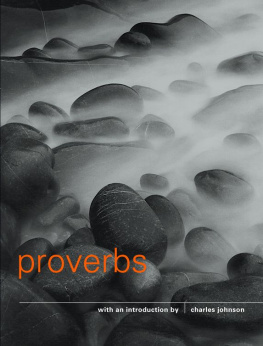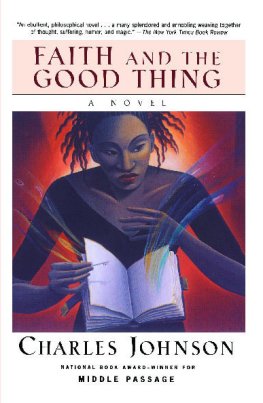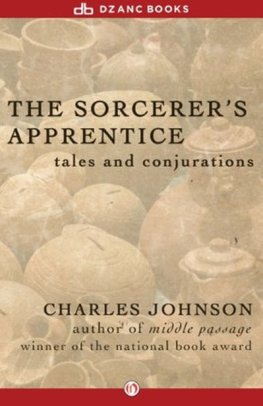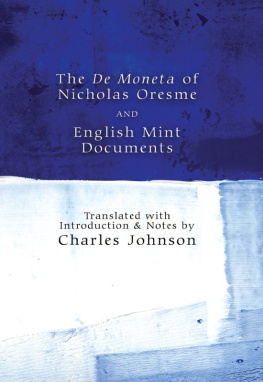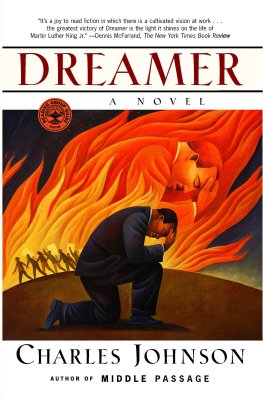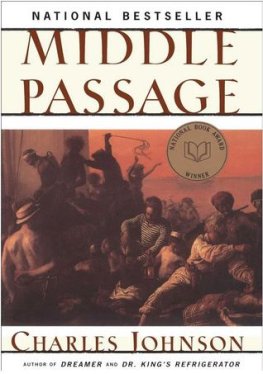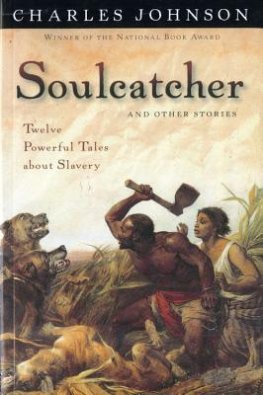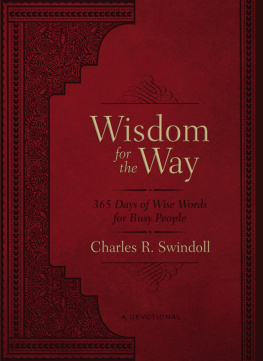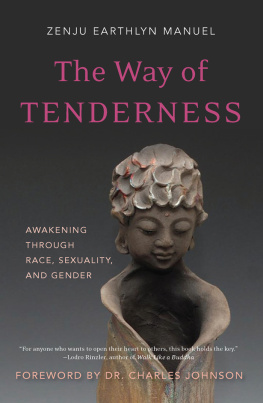Charles Johnson - Proverbs
Here you can read online Charles Johnson - Proverbs full text of the book (entire story) in english for free. Download pdf and epub, get meaning, cover and reviews about this ebook. year: 1999, publisher: Canongate Books, genre: Science. Description of the work, (preface) as well as reviews are available. Best literature library LitArk.com created for fans of good reading and offers a wide selection of genres:
Romance novel
Science fiction
Adventure
Detective
Science
History
Home and family
Prose
Art
Politics
Computer
Non-fiction
Religion
Business
Children
Humor
Choose a favorite category and find really read worthwhile books. Enjoy immersion in the world of imagination, feel the emotions of the characters or learn something new for yourself, make an fascinating discovery.
- Book:Proverbs
- Author:
- Publisher:Canongate Books
- Genre:
- Year:1999
- Rating:4 / 5
- Favourites:Add to favourites
- Your mark:
- 80
- 1
- 2
- 3
- 4
- 5
Proverbs: summary, description and annotation
We offer to read an annotation, description, summary or preface (depends on what the author of the book "Proverbs" wrote himself). If you haven't found the necessary information about the book — write in the comments, we will try to find it.
Drawn from the wisdom of ancient oral tradition, this book contains two main doctrines: teaching the attainment of wisdom, and warning against lifes pitfalls, from excessive drink to promiscuity. The text is introduced by Charles Johnson.
Proverbs — read online for free the complete book (whole text) full work
Below is the text of the book, divided by pages. System saving the place of the last page read, allows you to conveniently read the book "Proverbs" online for free, without having to search again every time where you left off. Put a bookmark, and you can go to the page where you finished reading at any time.
Font size:
Interval:
Bookmark:
Meditate, please, on the possibility that in life there is a goal, an end that makes all our worldly efforts intelligible. Carefully think it through: without a vision, either personal or political, the individual (or society) is like a city that is broken down, and without walls. This is not simply a question for the schools, for without a comprehensive and capacious philosophy life fails. The unsentimental implication here the basic, philosophical and secular premise is that life can be a perilous journey. Perhaps a social minefield. (Just read todays newspaper if you need proof that the world is and has always been a dangerous place.) And any young person hesitantly starting out on this odyssey, now or in the days of King Solomon, soon discovers that his (or her) chances for survival, prosperity and happiness are enhanced a hundred-fold if and only if they have a good map.
Put simply, Proverbs is that richly detailed, many-splendored map. A timeless wake-up call. More importantly, along with its companion books, the poetic wisdom literature of the Old Testament (Job, Ecclesiastes, The Song of Solomon, and Psalms), it is a two-millennium-old blue-print for the staggering challenge of living a truly civilized life. Culture, we realize after reading Proverbs, is an on-going project. We are not born with culture. Or wisdom.
And both are but one generation deep. Achieving either is a daily task requiring as much work for the individual as an artist puts into a perfectly balanced painting, or a musician into a flawless performance. (Thus one wonders if the great bulk of human-kind can be truthfully called either cultured or civilized.) Here, in this repository of moral instruction, in its 31 chapters, 915 verses, approximately 900 proverbs, and 15,043 words, the journey that we call a life is presented as a canvas upon which the individual paints skillfully a civilized self-portrait an offering that will please himself and the Lord. In chapter 3, we are told, Happy is the man that findeth wisdom. The Hebrew word for wisdom is chokmah. It occurs no less than thirty-seven times in Proverbs.Chokmah also means skillfulness in dealing with the job that is before us life itself and I believe it is comparable to the Greek word techne, the rational application of principles aimed at making or doing something well. The reader who takes Proverbs to heart, who believes like the Greeks that the unexamined life is not worth living, is by nature a lover of wisdom: a philosopher.
For that is precisely what the word philosophy means (philein, to love sophia, wisdom). Im aware those words wisdom, civilized and philosophy may sound musty and antique to modern (or post-modern) ears. As so many have said, ours is an Era of Relativism, or situational ethics, perhaps even of nihilism, an historical period in which Proverbs will for some readers seem right-wing and patriarchal, oppressive and harsh, dogmatic and illiberal. Many will regard its contents as obsolete for the conditions we face at the eleventh hour of the twentieth century because, above all else, we moderns value individual freedom. Unfortunately, our passion for liberty is often misunderstood as license or, more accurately, as licentiousness. Personally, as a Buddhist, I was at first wary of writing about this book, though I was raised on its vision in a midwestern, African Methodist Episcopal church.
But after going over Proverbs a half dozen times, after opening myself to its spiritual core, which complements nicely the worlds other great religious traditions, I re-discovered the gems it has offered western humanity for centuries. I saw in its gnostic truths the reason why Professor C E M Joad once defined decadence as the loss of an object in life. In fact, I realized that Proverbs not only speaks powerfully to our morally adrift era, but describes rather well my own often benighted, rebellious-on-principle generation (the Baby Boomers) when it says, There is a generation that curseth their father, and doth not bless their mother. There is a generation that are pure in their own eyes, and yet is not washed from their filthiness (30 :11-12). Chilling. Like all rich, multi-layered digests, Proverbs was not the work of a day.
Nor is it the product of a single author, though King Solomon, that Ur-figure among ancient wise men, is credited with having contributed two of its oldest sections That work, dating back to between 1000 and 600 BCE , was strictly a manual of professional training aimed at helping Egyptian civil servants achieve successful careers as they served the state. The sages of Israel, says Aitken, reworked some of the precepts from Instructions and at the same time re-contextualized them in a book far broader in its teachings for a triumphant life. And these were, of course, originally oral teachings. They were delivered by a sage to pupils he addressed as a father would his children. His young charges were expected to memorize the proverbs until they were hard-wired into their Yet, for all the sophisticated architectonics in Proverbs, and for all the complexity of its literary pedigree, this is a book that sketches out a compelling, classic story: a pilgrims progress. Imagine a young man (or woman) about to embark on lifes journey.
Call him well, Pilgrim. Then, as now, the world teemed with a kaleidoscope of temptations, stramash and confusion. In the bustling cities where colorful bazaars, beggers, thieves, perfumed harlots, con-men, murderers, insouciant idlers and false teachers eager to entice a young person toward wrong-doing and sin (one hoary meaning of which is to miss the mark), all can be found in great , As we have seen, if our young Pilgrim is not to lose his (or her) soul on this planet where everything is provisional, if he is not to end bellied up and bottomed out, he needs a damned good map. Ethically, he should not have to reinvent the wheel each time he is confronted by a new moral dilemma. That, I believe, would be like a physicist claiming he can learn nothing from Galileo, Newton, Copernicus or Einstein because the conditions of their time differed so much from his own. But young people are notorious for forgetting western, the Way of understanding and wisdom begins by sumptuously feeding the spirit and starving the illusory sense of the ego into extinction (Trust in the Lord with all thine heart; and lean not unto thine own understanding.
In all thy ways acknowledge him, and he shall direct thy paths. Be not wise in thine own eyes: (3 : 5-7)), and is realized through a worldly practice that gives priority to the experience of our elders (our global inheritance) over ephemerae in a life that embodies humility, service, and a cultures loftiest ideals, which in Pilgrims case would be the Ten Commandments. Wisdom in
Font size:
Interval:
Bookmark:
Similar books «Proverbs»
Look at similar books to Proverbs. We have selected literature similar in name and meaning in the hope of providing readers with more options to find new, interesting, not yet read works.
Discussion, reviews of the book Proverbs and just readers' own opinions. Leave your comments, write what you think about the work, its meaning or the main characters. Specify what exactly you liked and what you didn't like, and why you think so.

